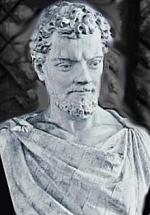Disable ads!
Lucretius
Titus Lucretius Carus (/ˈtaɪtəs lʊˈkriːʃəs/; c. 99 BC – c. 55 BC) was a Roman poet and philosopher. His only known work is the epic philosophical poem De rerum natura about the tenets and philosophy of Epicureanism, and which is usually translated into English as On the Nature of Things. Very little is known about Lucretius's life; the only certain fact is that he was either a friend or client of Gaius Memmius, to whom the poem was addressed and dedicated. The De rerum natura was a considerable influence on the Augustan poets, particularly Virgil (in his Aeneid and Georgics, and to a lesser extent on the Satires and Eclogues) and Horace. The work virtually disappeared during the Middle Ages but was rediscovered in 1417 in a monastery in Germany by Poggio Bracciolini, and it played an important role both in the development of atomism (Lucretius was an important influence on Pierre Gassendi ) and the efforts of various figures of the Enlightenment era to construct a new Christian humanism. The book The Swerve: How the World Became Modern (2011) by Stephen Greenblatt is a narrative of the discovery of the old Lucretius manuscript by Poggio.
 Read more on wikipedia.org Read more on wikipedia.org
 All quotes by Lucretius All quotes by Lucretius
 Edit Edit
|

|
|
|
|
|
Background photo by Giuliana
|